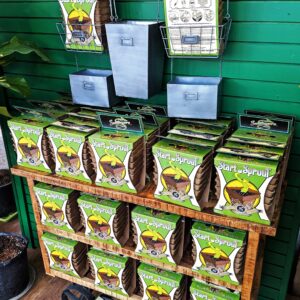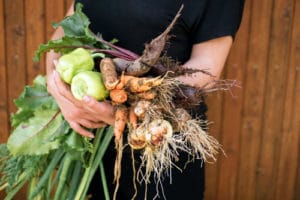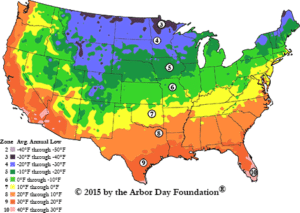 It may not feel like it, but spring is on its way! Now is a great time to get your seeds planted for both your flower and vegetable gardens. Getting your seedlings started now will give you a head start on your garden planting.
It may not feel like it, but spring is on its way! Now is a great time to get your seeds planted for both your flower and vegetable gardens. Getting your seedlings started now will give you a head start on your garden planting.
When the temperatures hover in the teens and twenties, it’s hard to think about planting, but reliable weather data tells a different story. The US Department of Agriculture has collected daily temperature data for decades. This data is bundled into 10-year averages to determine the minimum average winter temperature in each place in the US. The data allows gardeners (and more importantly farmers!) to figure out what to plant and when to plant it. The temperature data is overlaid onto “zones,” with each zone representing a 10°F change in the average minimum winter temperature.
A Wide Range Of Plants Thrive In Our Climate
The Tri-Cities area straddles hardiness zones 7a and 7b. This means our ten-year average minimum winter temperature falls between 0°F and 10°F. It also means that a wide range of plants will thrive in our relatively temperate climate. The Zone 7 season is long enough to provide a full growing season for most vegetables. The last frost date for Zone 7 is typically April 15 and the first frost date is November 15. That gives us seven full months of reliable growing weather!
Start your vegetable garden now!
 For vegetable gardens, start seeding the hardiest vegetables right now. That includes broccoli, cauliflower, and peas. If you start your seedlings now, you can get two full harvests from your plants in 2019. With these three plants, you can harvest your first crop in mid- to-late May. These plants don’t perform well at the height of the summer heat, but you can replant again in August for a second harvest in mid-November! You can also plant garlic bulbs in the early spring. Ask us about which spring varieties will work best for you.
For vegetable gardens, start seeding the hardiest vegetables right now. That includes broccoli, cauliflower, and peas. If you start your seedlings now, you can get two full harvests from your plants in 2019. With these three plants, you can harvest your first crop in mid- to-late May. These plants don’t perform well at the height of the summer heat, but you can replant again in August for a second harvest in mid-November! You can also plant garlic bulbs in the early spring. Ask us about which spring varieties will work best for you.
At the beginning of March, start beets, cabbage, carrots, kale and lettuce, onions, peppers, spinach and tomatoes. With the exceptions of onions, peppers and tomatoes, you can get a second harvest from the rest of this group by replanting in August.
Beans, Brussels sprouts, corn, cucumber and squash can all wait until late April or early May for seeding, thanks to our long growing season. For these crops, you should expect only one harvest.
Tri-Cities Flower Gardening
 If you prefer flower gardening, Zone 7 offers a wide range of annual and perennial options. Annual flowers must be replanted each year. They do not reseed, and the plant cannot survive a frost. Perennial plants return year after year. You can find both annuals and perennials that thrive in the shade, in partial sun or full sun. Here are some Zone 7 annual options for each.
If you prefer flower gardening, Zone 7 offers a wide range of annual and perennial options. Annual flowers must be replanted each year. They do not reseed, and the plant cannot survive a frost. Perennial plants return year after year. You can find both annuals and perennials that thrive in the shade, in partial sun or full sun. Here are some Zone 7 annual options for each.
Shade Loving flowers
Annuals: Impatiens and Coleus do well in areas that are largely shaded. This includes northern exposures and areas with heavy tree cover.
Perennials: Hostas do well in the shade and will return yearly. You can manage overgrowth by splitting Hosta plants and replanting them in other shady locations.
Partial Sun flowers
Annuals: Ageratum, Bacopa, Begonias, Calendula, Lobelia, Petunias, and Snapdragon all do well in partial sun.
Perennials: Bee Balm, Bleeding heart, Black-eyed Susan, Chrysanthemums, Clematis, Columbine, Dianthus, Forget-Me-Not, Four O’clock, Iris, Painted daisy, Penstemon, Peony, Phlox and Shasta daisy are all good choices for partial sun plantings. Many of these plantings will also do well in full sun.
Full Sun flowers
Annuals: Bachelor’s button, celosia, cosmos, gazania, geranium, heliotrope, lantana, marigolds, moss rose, nasturtium, sunflowers, sweet pea, zinnia,
Perennials: Aster, Basket of gold, Butterfly weed, Candytuft, Coneflower, Hollyhock, Lavender and Salvia thrive in full sun locations.
Let Us Help You Plan Your 2019 Garden
Our friendly, knowledgeable staff can help you choose the right seeds, feed and soil to firm up your 2019 garden plan and help your plants thrive!
 Want To Create A Fairy Garden?
Want To Create A Fairy Garden?
We also offer Fairy Garden Classes! If you’d like to have a little fun with your landscaping, a Fairy Garden may be just the thing for you. Due to the cold weather, we’ve had to push these classes back to March! If you’re interested, please visit our Classes and Events page for more details!
Stop by our shop for more information about spring planting. We have everything you need to make your garden fabulous!

